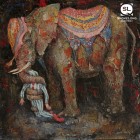The conflict in “Aquarium” comes from the narrator’s failure to understand her brother’s new life in a new country. You’ve lived in Malaysia, Hong Kong, and now England. How have your experiences in new countries shaped or inspired your writing?
It’s an interesting word, “shape.” I’m pulled into a new shape each time I live in a different place; what’s remarkable is that gradually I realize that as elastic and unrecognizable a shape I am to others, at my core I haven’t changed. It’s that dynamism and elasticity interacting with the core of who I am that I’m trying to funnel through every time I’m in front of a blank page.
In this story, the narrator and her brother connect over animals (and their deaths). You write “A farmhand had taken a bandsaw to a dead cow and dismembered it; Ewan and I had applauded.” What led you to this startling incident?
Underlying menace, I find, can be in a lot of our relationships, submerged in our subconscious because it’s easier not to deal. That menace can form a very strong bond between people who’ve experienced it. They were children who had known violence. When violence comes from an authoritative figure, it can be interpreted by children as “role modeling.”
The narrator hints at a difficult, possibly even abusive, father, yet never reveals why thinking about him is so upsetting. Why did you choose not to disclose more backstory?
I wanted to reflect her state of mind—the inability to come to terms—to even confront—the violence suffered at the hands of an abusive dad, but I believe our subconscious works like this—circling and circling around that which pains us deeply but never daring to go close. Mo Yan has an incredible phrase in Red Sorghum to describe the past, “The eternally living past, the unstoppable present.”
One repeated sensory detail is coldness. How does the recurring description of sleet, icicles, and frost reveal the characters’ motives?
The “frozen” imagery when contrasted against the “tropical” fish, for me, is to show the rupture in the bond between Ewan and his sister. They were bonded by violence, but in this new “cold country” Ewan is changing (“unstoppable present”), and the narrator is deathly afraid of the change this would wreak in her sibling relationship. Actually, she’s the one buried or frozen in coldness, in “staticity,” because she is still stuck in the same place, still circling.
“Love is many things, but it’s also a bloated tropical fish.” I love this line. Can you explain what it means?
I would love to hear what readers think: will they conclude she did something to the fish? And if she did, is her love for her brother now a dead fish? But she doesn’t say “dead.” I know it can be very annoying when a writer makes it vague like this—I do it here after a lot, a lot of thought. I think our narrator’s motives/desires are hidden from herself. How much “bloated” love is there for her brother? And by doing this, is she subconsciously trying to remind Ewan of that love?



 The core workshop of SmokeLong Fitness is all in writing, so you can take part from anywhere at anytime. We are excited about creating a supportive, consistent and structured environment for flash writers to work on their craft in a community. We are thrilled and proud to say that our workshop participants have won, placed, or been listed in every major flash competition. Community works.
The core workshop of SmokeLong Fitness is all in writing, so you can take part from anywhere at anytime. We are excited about creating a supportive, consistent and structured environment for flash writers to work on their craft in a community. We are thrilled and proud to say that our workshop participants have won, placed, or been listed in every major flash competition. Community works.